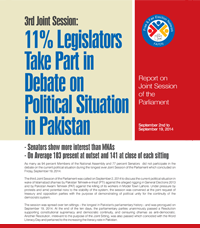Islamabad, September 21, 2014: As many as 94 percent Members of the National Assembly and 77 percent Senators did not participate in the debate on the current political situation during the longest ever Joint Session of the Parliament which concluded on Friday, September 19, 2014, says Free and Fair Election Network (FAFEN) in its report on the third Joint Parliament Session.
The third Joint Session of the Parliament was called on September 2, 2014 to discuss the current political situation in wake of Islamabad dharnas by Pakistan Tehreek-e-Insaf (PTI) against the alleged rigging in General Elections 2013 and by Pakistan Awami Tehreek (PAT) against the killing of its workers in Model Town Lahore. Under pressure by protests and amid potential risks to the stability of the system, the session was convened at the joint request of treasury and opposition parties with the purpose of demonstrating of political unity for the continuity of the democratic system.
The session was spread over ten sittings – the longest in Pakistan’s parliamentary history – and was prorogued on September 19, 2014. At the end of the ten days, the parliamentary parties unanimously passed a Resolution supporting constitutional supremacy and democratic continuity, and censuringdharnas as anti-democratic. Another Resolution, irrelevant to the purpose of the Joint Sitting, was also passed which coincided with the Word Literacy Day and pertained to the increasing the literacy rate in Pakistan.
While the treasury has been successful in drawing the support of all opposition parties against the Islamabad dharnas and their demands concerning the resignation of the Prime Minister as raised by PTI and dissolution of all assemblies as raised by PAT, the support came at a price. Opposition parties raised serious concerns with the style of governance of the PML-N government, leading to embarrassing moments for the treasury benches.
Considering the political importance and symbolism of the Joint Session, the attendance and participation of legislators remained dismal. With the exception of parliamentary party leaders and certain other prominent legislators, most of the 446 legislators of Parliament remained silent throughout the debate. Only three out of the 85 women legislators spoke on the Motion under Rule 259 about the political situation in Pakistan. Attendance during the session was also observed to be low, with an average of only 103 (23 percent) legislators present at the outset and 141 (32 percent) at the end of each sitting.
Most conspicuous, however, was the attendance of the Prime Minister, who attended nine sittings for a total of 1,025 minutes. This was a marked improvement from the first parliamentary year when he attended only seven out of 99 sittings. On the other hand, the Leader of the Opposition attended 77 sittings during the year. During this third Joint Session of Parliament, he was present for nine sittings for 1,256 minutes.


